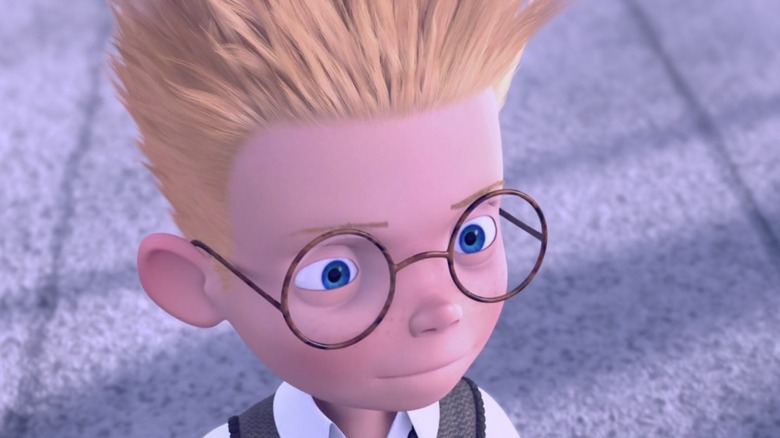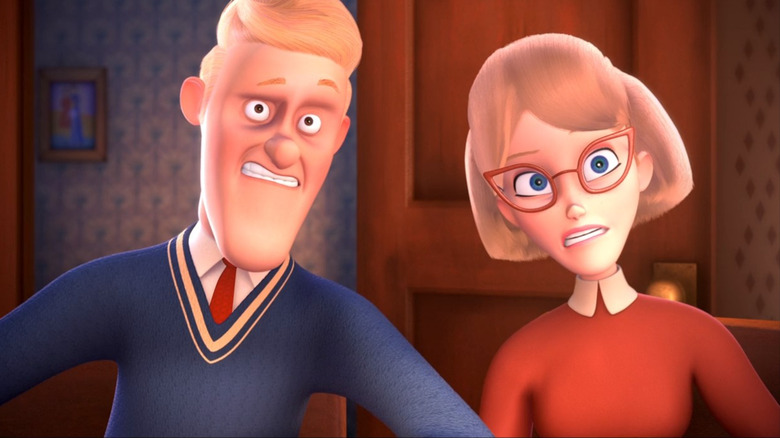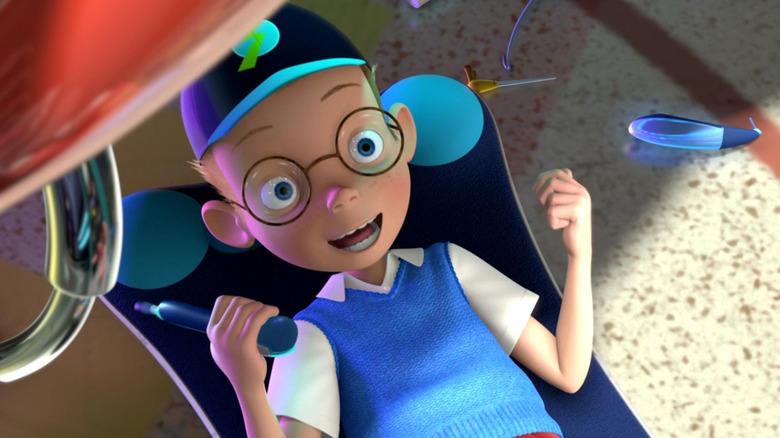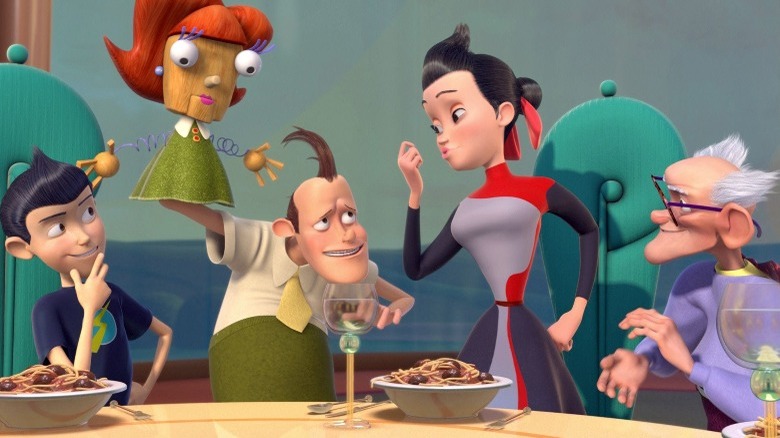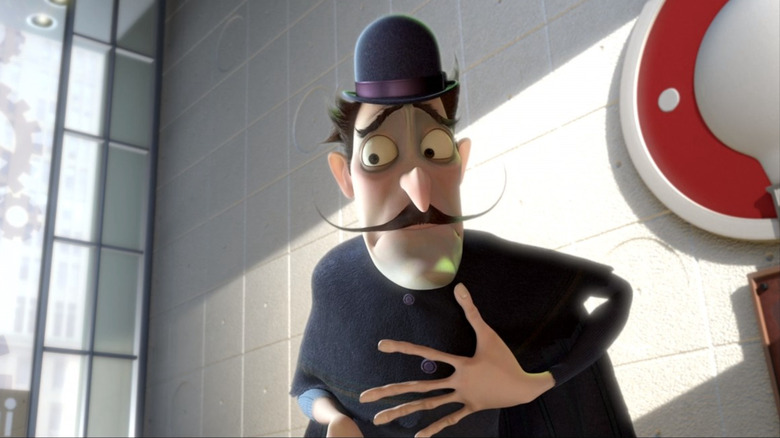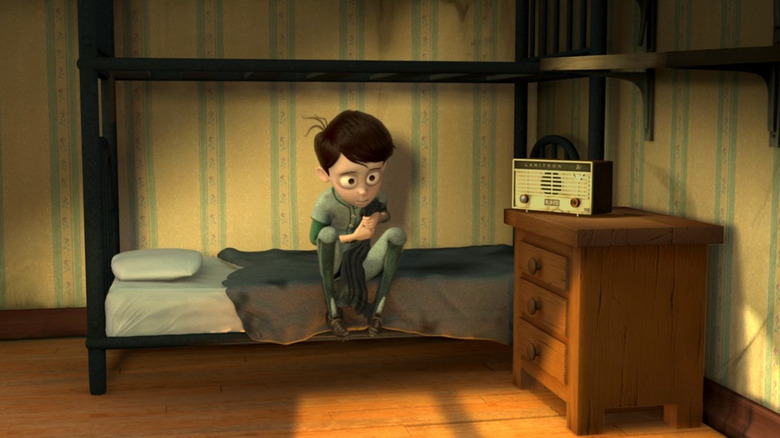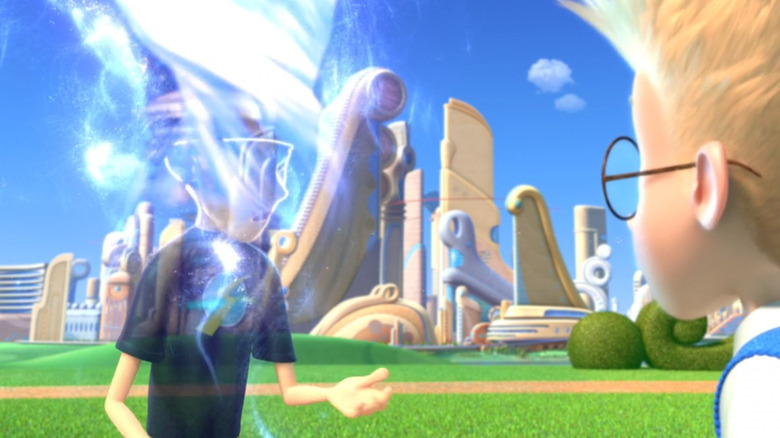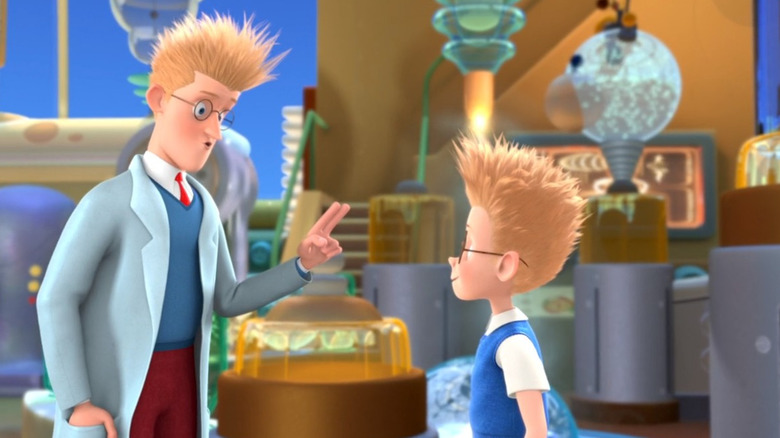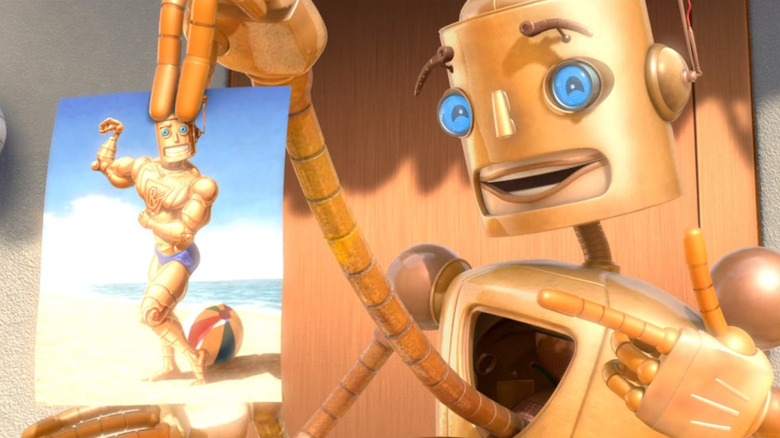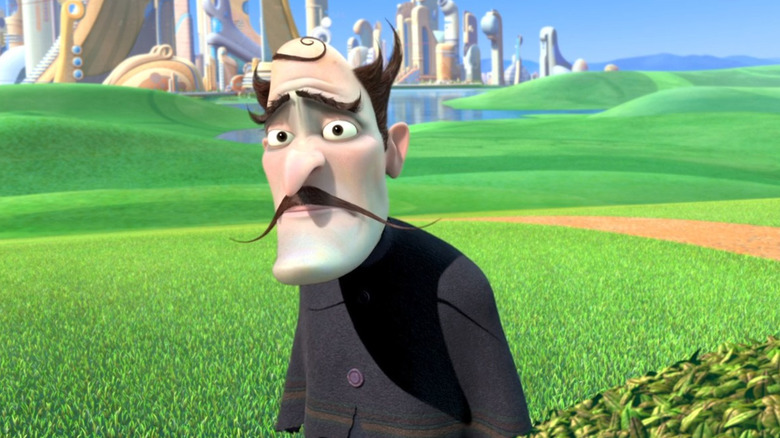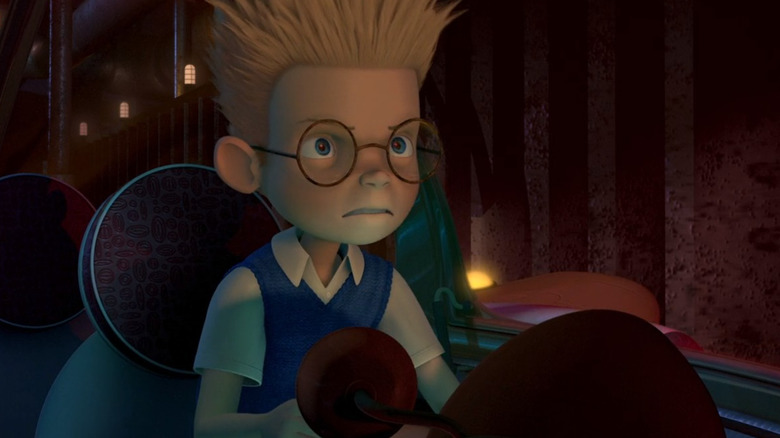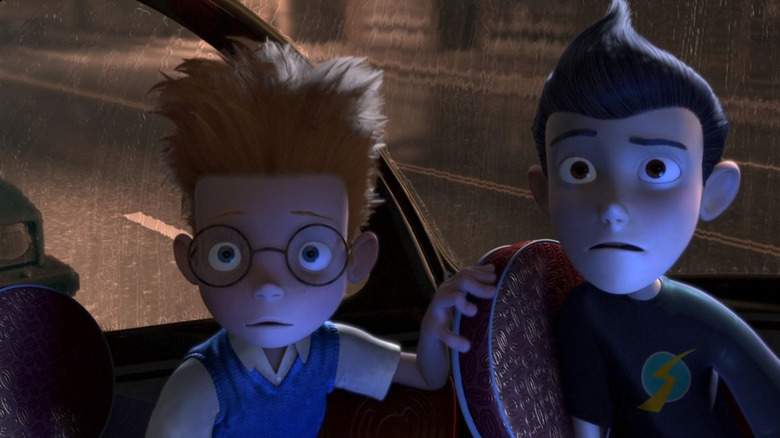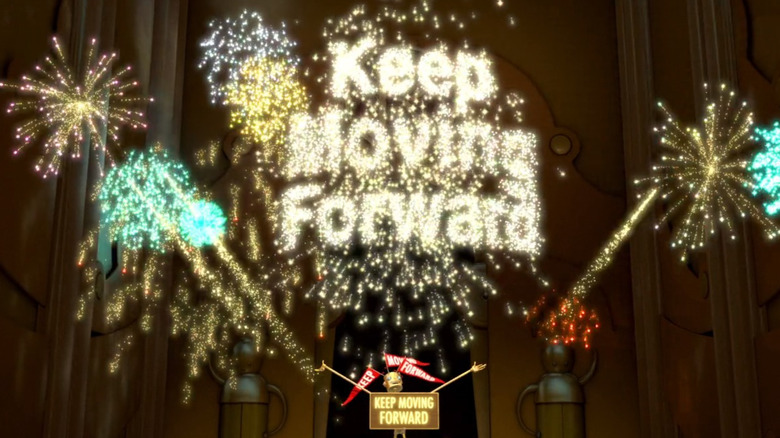Things Only Adults Notice In Meet The Robinsons
It's interesting how many children's stories use time travel as a fun plot device without considering the broader, often mind-bending implications it contains. It's a strange and abrupt pivot to take your standard "once upon a time there was a child who longed for adventure" storyline, and then complicate it with "oh yeah, and the fundamental laws of physics are different and time travel is possible." After two linear adventures, for example, the third "Harry Potter" book and movie bust out a time-traveling stopwatch.
2007's "Meet the Robinsons" at least doubles down by making time travel central to the entire plot of the movie, and it's charming enough in spite of the confusing nature of its plot to garner decent reviews and a modest return at the box office. But while its earnest message about continuing on in the face of failure holds up well, it raises a lot more questions for fans of the movie that are 15 years older than they were when it came out, having time-traveled to the present the normal way: Just living each day, one at a time. Whether you consider its mechanics in a vacuum or compare them to other time travel franchises like "Back to the Future" or "Terminator," "Meet the Robinsons" has a maze of logistical and tonal riddles to answer for when viewed from a more critical, adult lens.
Adults in this world really hate child inventors
"Meet the Robinsons" begins with a baby being abandoned at an orphanage, and we skip straight ahead to the now 12-year-old Lewis flubbing an adoption interview. His prospective parents, the Harringtons, seem absurdly anxious, and are made extremely uncomfortable by Lewis when he attempts to demonstrate a new invention: A machine that makes peanut butter and jelly sandwiches. And granted, Mr. Harrington has a peanut allergy, but in what world is a 12-year-old inventor not objectively adorable? Do the Harringtons hate enthusiasm in general? Do they just not understand children, who are often known to display unbridled enthusiasm for things?
We then learn that this failed interview is Lewis's one hundred and twenty-fourth such awkward misconnect. Does "Meet the Robinsons" exist in the world of "Interstellar," where humanity is discouraged from scientific innovation in order to focus on farming? It seems impossible on the face of it that Lewis has shown up with 124 different inventions that all subsequently malfunctioned with the exact wrong people. He's a bright, cheerful kid that seems to have had the most absurdly terrible luck: He's interviewed with 248 adults who were all just there to cruelly waste everyone's time.
It's very unlikely Lewis could actually fix the time machine
It's a beautiful moment when Wilbur asks Lewis to fix the time machine. When you learn who Lewis turns out to be in the future, it makes total sense, but no matter how you think about it, a 12-year-old boy repairing something that complex and unfamiliar just goes well past the suspicion of disbelief. Lewis, after all, has only made a memory scanner that didn't function and a peanut butter and jelly sandwich machine that sprayed condiments all over the room and nearly killed somebody.
Moreover, the time machine is by definition from the future, and would thus be well past the standards of any technology that Lewis would be familiar with. "Meet the Robinsons" has a good message, and no one wants Lewis to fail necessarily. But in skipping over the actual details and hard work involved in any of Lewis's inventions and reducing them to a montage, the movie turns his talent into a "deus ex machina" that only works when the story needs it to. It helps that he learns to believe in himself, but it seems like there would be a lot of time and actual science involved in his scientific breakthroughs.
The Robinsons are a little too eccentric
Taken at face value, the Robinson family is a delightfully eccentric group. They live life at a frenetic pace, have varied interests, and clearly all get along together very well. But they must be a nightmare to live with day to day, driven to idle obsessions by the vast wealth that Cornelius Robinson's business empire has provided them.
There are two uncles who spend all day and night hiding in potted plants, and one that is convinced his hand puppet is alive in a frightening display of never-ending ventriloquism. An over-grown child uncle uses a spaceship to deliver pizza while speaking in "Flash Gordon" style mannerisms that belie an obvious case of arrested development. There's a daredevil who launches himself out of a cannon, and an uncle that whines like a child when he doesn't get a sandwich in a timely fashion. In short, meeting the Robinsons in "Meet the Robinsons" is a whirlwind tour of dysfunction, the exact kind of chaos that seems fun to kids, but doesn't typically define adult life.
What does Doris need Bowler Hat Guy for?
In classic Disney movie fashion, the sinister-looking Bowler Hat Guy turns out to be more of a bumbling fool than a villain. We learn quickly that the real brains of the operation is in fact the bowler hat itself, a rogue invention from the future named DOR-15 or "Doris" for short. In fact, not only is Doris clearly calling the shots, but Bowler Hat Guy frequently defies orders and causes plans to go hilariously awry, making one wonder what Doris even needs him for in the first place.
It's implied that he serves two functions. First, perhaps the time machine that he steals requires a human driver — although Doris seems to be capable of manipulating just about anything with its various metal arms that are normally retracted inside. Second, Bowler Hat Guy is key to Doris's plan to take credit in the past for Lewis's memory scanner, and be a patsy for creating an alternate, dystopian future. But it's clear from Bowler Hat Guy's first disastrous performance with the business executives that literally any other patsy would have been better for the job. Without a clear idea of Doris's motivations or more information on how it first teamed up with Bowler Hat Guy, the villainous duo of "Meet the Robinsons" are just a comical mismatch with no real explanation.
The film has a deep and powerful lesson about failure
"Meet the Robinsons" has a broadly inspirational moral, as many kids' films do. The Robinson family credo of "keep moving forward" sums up succinctly what the events of the movie teach Lewis: Failure is an integral part of success, and it's essential to persevere in the face of long odds and disappointment. By itself, it puts the movie firmly in the realm of simple motivational platitudes like "Just keep swimming" from "Finding Nemo," a bland and mostly forgettable message to wrap the story around.
It's what we learn about the future of Goob, Lewis's wry and laconic roommate, that really gives "Meet the Robinsons" a depth in its aphorism that many kids' movies lack. An exhausted Goob falls asleep in the middle of a baseball game and misses the winning catch, and then he lets that one mistake define the rest of his life, becoming obsessed with revenge against Lewis for keeping him up all night. In Goob's story, we see the reason to "keep moving forward" isn't just to accomplish things necessarily, but also to not let failure define you. Lewis even handles this revelation with maturity, as he apologizes to Goob for causing his mistake but rightly points out that the rest of Goob's life is his own responsibility.
The logistics of time travel are inconsistent
Time travel is one of the most frequently used science fiction gimmicks. It's obviously fictional, so it doesn't have much actual science that it has to follow, but the best time travel stories establish rules for the way that it functions within its specific reality, and then (hopefully) stick to those rules. This is important so the audience knows the actual stakes and consequences of what's happening. In "Meet the Robinsons," it seems like the movie is making up new rules as it goes along.
As we see in many movies with fuzzy logic, it seems possible to alter the entire timeline in "Meet the Robinsons" if an event of enough supposed significance happens, like Lewis's science fair presentation beginning his career as an inventor. The future remains unchanged when Bowler Hat Guy disrupts this initially, but is transformed in real-time in front of the Robinsons at a later point in the film. Likewise, when Lewis causes Doris to vanish by saying "I'm never going to invent you," the dystopian future is still lingering for a moment when he travels forward in time again, as though time travel has to buffer like the internet.
Knowing your own future would be boring
"Meet the Robinsons" ends happily. At the age of 12, Lewis knows he'll become a famous inventor and create time travel. He knows what his entire extended family will be like, he's met his future wife, and he knows the name of his own future son. It seems like it would be a little strange, if not downright existentially unsettling, to know so much of your own future in advance.
The very reason the future is associated with hope and excitement is that it's unknown. In addition to the multiple insoluble paradoxes that knowing so much of his own future creates, Lewis seems like he would be doomed to spend the rest of his life contemplating the nature of free will. Does he marry Franny because he loves her, or because he's fulfilling a destiny chosen for him by time itself?
Everyone's remarkably calm about paradoxes
It befits "Meet the Robinsons" and its casual attitude about time travel that no one really seems to worry about paradoxes. As long as the big events happen in the right order, it doesn't seem to matter how much knowledge Lewis gains about the future. It seems like, at the very least, Wilbur dances around revealing Lewis's identity by falsely claiming that Cornelius (who's actually Lewis in the future) looks like Tom Selleck. But eventually, Cornelius and Lewis meet in person and no one is even all that alarmed — Cornelius is also voiced by Tom Selleck in a weird meta-detail that's more confusing than anything.
The only time anyone even vaguely addresses the issue of time-displaced causality is when Lewis asks his future self whatever happened with meeting their birth mother, and Cornelius replies that Lewis will just have to figure that out for himself. But what's one more detail if Lewis knows literally everything else about his future? What would happen if he decided to do everything differently instead of just not inventing Doris? What if he made Carl the robot as buff as he asked to be instead of skinny? "Meet the Robinsons" dismisses all of these questions with a wink and laugh.
What happens to Goob in the new future?
In general, Goob/Bowler Hat Guy seems like a missed opportunity of a character, as his journey is a dark mirror of Lewis's, but he gets much less character development. The last we see of adult Goob, he's walking forlornly into an unknown future after sadly declining a chance to be "adopted" by the Robinsons (a decision that Wilbur can apparently make on his own teenage authority). He's spent his life consumed by regret and revenge, and now sees that it was all a waste.
When Lewis returns to the past, of course, he rewrites Goob's future by waking him up just in time to make the game-winning catch in Little League, and the much jollier Goob is soon adopted and goes off to a presumably much different future. It's unknown what becomes of him as an adult, however. Do he and Lewis remain friends? Does he become a professional baseball player? After being so important to the story, a grace note in the revised future for Goob would have been nice.
Why doesn't Lewis time travel as soon as he fixes the machine?
In the most exciting action sequence of the film, Lewis fixes the time machine just as its pushed off a ledge, and then escapes countless evil Doris-machines in a future that's rapidly transformed into a dystopian nightmare. He dodges between buildings and witnesses all of humanity enslaved by their own bowler hats, and eventually goes back in time to set everything right once and for all.
It's a thoroughly impressive bit of animation, and ultimately you kind of wish that more of the movie had taken place in the dark, dystopian version of the future, for adventure's sake. But during this scene, you're left wondering: Why doesn't Lewis just time travel immediately? That's the primary purpose of a time machine, after all. It's great that we get a thorough look at how bad Doris has made the world, and how important his mission has now become, but it's a bit of needless wheel spinning that undercuts what should be a dramatic and exciting chase sequence.
Wilbur risks erasing himself again
A deal's a deal: Even though Wilbur was lying initially when he made an agreement with Lewis to fix the time machine, at the end of the movie he does the right thing and takes him back to the night his birth mother left him at the orphanage, just as he promised he would. Lewis approaches his mother and nearly touches her, but ultimately decides to let her leave and not interfere, choosing the life he's known and his future among the Robinsons in the process.
It's a nice moment, but Wilbur doesn't even seem to process or realize that he's just risked his own life and come very close to ceasing to exist for the second time. If Lewis meets his birth mother, he'll never be adopted by the Robinsons, and Wilbur will presumably be sucked up into the same vortex of time-adjusting that took him away before.
Where did Keep Moving Forward come from?
"Meet the Robinsons" is full of strange, chicken-and-egg stylistic details that are delivered from the future to the past, so it's not clear where they came from. Lewis chooses the new name "Cornelius" because he knows he has it in the future, for example. But the biggest one is probably the Robinson family motto that's central to the film's emotional story, and becomes a fundamental part of Lewis's adult identity. But where did "keep moving forward" come from? Is everything in Lewis's future, his drive, his company, and the time machine itself, all a result of three words that he learned from ... out of the ether?
If the small details that come from causal loops due to time travel are curious, then for the main character to import his own life philosophy from his future self is positively mind-boggling. Perhaps Lewis was a fan of Walt Disney before the events of the story began, and picked up the phrase from a quote that "Meet the Robinsons" ends with: "We keep moving forward, opening new doors and doing new things, because we're curious and curiosity keeps leading us down new paths."
